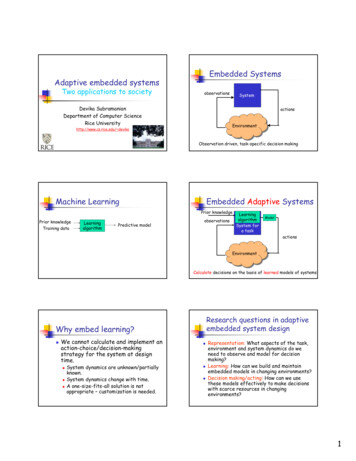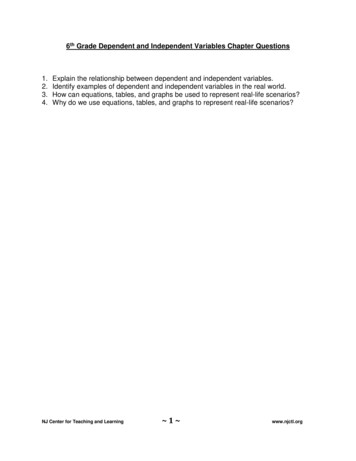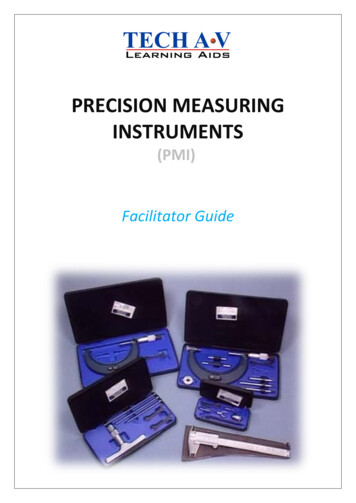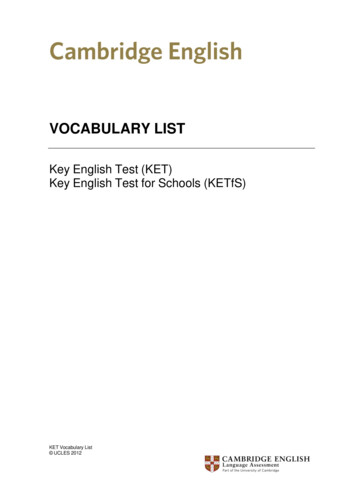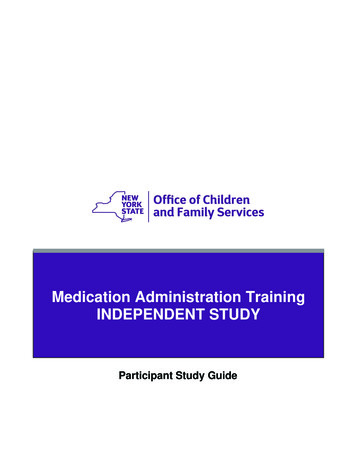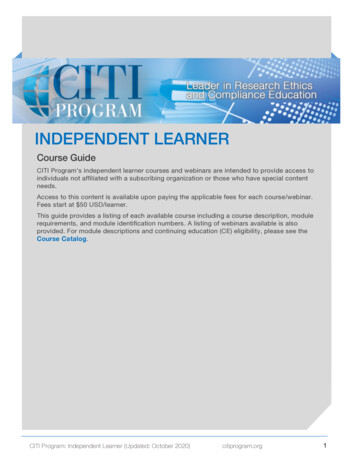
Transcription
INDEPENDENT LEARNERCourse GuideCITI Program’s independent learner courses and webinars are intended to provide access toindividuals not affiliated with a subscribing organization or those who have special contentneeds.Access to this content is available upon paying the applicable fees for each course/webinar.Fees start at 50 USD/learner.This guide provides a listing of each available course including a course description, modulerequirements, and module identification numbers. A listing of webinars available is alsoprovided. For module descriptions and continuing education (CE) eligibility, please see theCourse Catalog.CITI Program: Independent Learner (Updated: October 2020)citiprogram.org1
Table of ContentsAnimal Care and Use (ACU) . 4ACU Basic Courses . 5Working with the IACUC . 5Essentials for IACUC Members . 6IACUC Community Member . 6Post-Procedure Care of Mice and Rats in Research: Minimizing Pain and Distress. 7Wildlife Research . 7Post-Approval Monitoring (PAM) . 8Institutional Official: Animal Care and Use . 8IACUC Chair . 8ACU Refresher Courses . 9Working with the IACUC – Refresher . 9IACUC Member Refresher Case Studies . 10Animal-Specific Courses . 12Working with Amphibians in Research Settings. 12Working with Cats in Research Settings . 12Working with Cattle in Agricultural Research Settings . 13Working with Dogs in Research Settings . 13Working with Ferrets in Research Settings . 13Working with Fish in Research Settings . 14Working with Genetically Modified Mice in Research Settings . 14Working with Gerbils in Research Settings . 14Working with Guinea Pigs in Research Settings . 15Working with Hamsters in Research Settings . 15Working with Horses in Agricultural Settings . 15Working with Mice in Research Settings . 16Working with Non-Human Primates in Research Settings . 16Working with Rabbits in Research Settings . 16Working with Rats in Research Settings . 17Working with Reptiles in Research Settings. 17Working with Sheep and Goats in Research Settings . 17Working with Swine in Research Settings . 18Working with Zebrafish (Danio rerio) in Research Settings . 18Bioethics . 19Biomedical PI . 20Biosafety and Biosecurity (BSS) . 21Animal Biosafety . 21Biosafety and Biosecurity (BSS) Complete Series . 21Biosafety Retraining . 23Dual Use Research of Concern (DURC) . 23Emergency and Incident Response to Biohazard Spills and Releases . 24Human Gene Transfer . 24Initial Biosafety Training . 24Institutional Biosafety Committee Member Training . 25Nanotechnology . 26NIH Recombinant DNA Guidelines . 26OSHA Bloodborne Pathogens . 26Personal Protective Equipment . 27Select Agents, Biosecurity, and Bioterrorism. 27Shipping and Transport of Regulated Biological Materials . 27USDA Permits . 28Hazard Commnication . 28Clinical Research Coordinator (CRC) . 29CRC Foundations . 29CRC Advanced. 30CITI Program: Independent Learner (Updated: October 2020)citiprogram.org2
CRC Combined . 30Clinical Trial Billing Compliance (CTBC) . 32Compensation Reporting (Effort Reporting) . 33Conflict Management . 34Conflicts of Interest (COI) . 35COI Basic Course . 35COI Basic . 35COI Refresher Course . 36COI Refresher . 36Disaster Planning for the Research Enterprise (DPRE) . 37Essentials of Grant Proposal Development . 38Essentials of Research Administration . 39Essentials of Statistical Analysis (EOSA) (Formerly Fundamentals of Biostatistics) . 40EOSA Complete: Parts 1, 2, and 3) . 40EOSA: Part 1 . 41EOSA: Part 2 . 41EOSA: Part 3 . 42Export Compliance (EC) . 43EC Basic . 43EC Refresher . 44False Claims Act: A Primer and Guide for Research Organizations . 45FDA Inspections: From Site Preparation to Response . 46GDPR for Research and Higher Ed . 47Good Clinical Practice (GCP). 48GCP Basic Courses . 48GCP for Clinical Trials with Investigational Drugs and Medical Devices (U.S. FDA Focus) . 48GCP for Clinical Trials with Investigational Drugs and Biologics (ICH Focus) . 49GCP for Clinical Investigations of Devices . 51GCP Refresher Courses . 52GCP FDA Refresher . 52GCP ICH Refresher . 53GCP Device Refresher . 53GCP SBR Advanced Refresher . 54Good Laboratory Practice (GLP) . 55Healthcare Ethics Committee (HEC). 56Human Subjects Research (HSR) . 57HSR Basic Courses . 57Biomedical Basic . 57Social-Behavioral-Educational Basic . 58IRB - Biomedical Focus . 61IRB - Social-Behavioral-Educational Focus . 64IRB - Biomedical and Social-Behavioral-Educational Combined . 66IRB Chair . 69Institutional/Signatory Official: HSR Course. 69Essentials of Public Health Research . 70Revised Common Rule Update Course . 70Single IRB (sIRB) Use and Administration . 71HSR Refresher Courses . 72Biomedical Refreshers . 72Social-Behavioral-Educational Refreshers . 72Biomedical and Social-Behavioral-Educational Combined Refresher . 75HSR CIP Certified Courses . 77Comprehensive CIP Course for Advanced Learners. 77CIP Course for Advanced Learners – Biomedical and FDA Research Topics . 78CIP Course for Advanced Learners – Research with Vulnerable Populations and Consent Topics . 79CIP Course for Advanced Learners – IRB Administration Topics . 80IACUC Administration . 81CITI Program: Independent Learner (Updated: October 2020)citiprogram.org3
IACUC Administration . 81Information Privacy and Security (IPS) . 82Health Privacy . 82Information Security . 82Family Educational Rights and Privacy Act (FERPA) . 83IRB Administration . 84Laboratory Chemical Safety . 85Protocol Registration and Results Summary Disclosure in ClinicalTrials.gov . 86Research Study Design . 87Responsible Conduct of Research (RCR) . 88RCR Basic Course . 88RCR Basic . 88RCR Refresher Course . 89RCR Refresher . 89Semiannual Evaluations In Depth . 90Technology, Ethics, and Regulations . 91Technology Transfer . 92Undue Foreign Influence: Risks and Mitigations . 93Webinars. 94Ethics & Policy Issues in CRISPR Gene Editing . 94The Challenge of Medicare Advantage Plans and Local Coverage Determinations . 94Export Compliance: An Overview for Staff, Students, and Faculty . 94Informed Consent and Clinical Investigations: A Focus on the Process) . 95International Students in Focus at U.S. Higher Education Institutions (HEIs) . 96Research with Native American Communities: Important Considerations When Applying Federal Regulations . 97Preparing for Single IRB (sIRB) under the Common Rule . 97Running a Virtual IRB Meeting . 97Medical Marijuana: A Budding Field of Research . 97Understanding Consent Requirements and “Key Information” Under the Revised Rules . 98Health Disparities: Promoting Equity and Diversity in Clinical Research . 98Artificial Intelligence (AI) and Human Subject Protections . 98Social Media and Research Recruiting . 98FERPA: A Quick Review of the Law for Researchers and IRBs . 99GDPR & Human Subjects Research in the U.S. . 99Protocol Registration and Results Summary Disclosure in ClinicalTrials.gov . 100Importance of Peer Review and Data Validation in Research . 101Transitioning Research to the Revised Common Rule: The What, How, and Why . 102Revised Common Rule Webinar: Overview of Revisions . 102Revised Common Rule Webinar: Revisions to Definitions . 102Revised Common Rule Webinar: Revisions to Informed Consent . 102CITI Program: Independent Learner (Updated: October 2020)citiprogram.org4
Animal Care and Use (ACU)ACU Basic CoursesThis section presents the basic ACU courses available to independent learners. For moduledescriptions, see the ACU Catalog.Working with the IACUCThis course is intended for laboratory research personnel who will write animal-use protocols for reviewby an Institutional Animal Care and Use Committee (IACUC) member or who will handle animals undersuch protocols. It provides basic information regarding the U.S. regulations for protection of animalsubjects used in research, teaching, and testing. It describes the sources and applicability of regulationsgoverning animals in these uses, as well as the role, authority, and composition of the IACUC, the typesof IACUC review, and the items of information required for the review. It discusses animal surgery, bloodsample collection, antibody production (this is discussed specifically in the Antibody Production inAnimals module), and euthanasia. General discussions are also provided for requirements for personneltraining and experience, and occupational health and safety. Recommendations for housing rodents,exercising dogs, enriching the environment of primates, and using human patient care areas for animalsare provided. Finally, there is a discussion of the requirements for making changes in a project involvinganimals and the procedures for reporting inappropriate use of animals.Learners must complete 9 required modules with an average score of 80 percent on all quizzes to earn acompletion report. Eight supplemental modules are presented, which may be reviewed at the learner’sdiscretion. This course has a one-year expiration period.ModuleTitleRecommended UseWorking with the IACUC: IntroductionRequired17660 (English)About the IACUCRequired17661 (English)Federal Laws, Policies, and GuidelinesRequired17662 (English)Planning Research and Completing the Protocol FormRequired17663 (English)Procedures: Surgery, Antibody Production, and Blood CollectionRequired17664 (English)Personnel and Their WelfareRequired17665 (English)Special Animal Welfare ConsiderationsRequired17666 (English)Making Changes to an Approved Animal Use ProtocolRequired17667 (English)Reporting
This course is intended for laboratory research personnel who will write animal-use protocols for review by an Institutional Animal Care and Use Committee (IACUC) member or who will handle animals under such protocols. It provides basic information regarding the U.S. regulations for protection of animal
